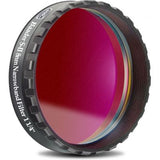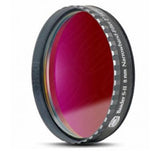Baader SII 8NM Narrowband CCD Filter
SII CCD Narrowband-Filter (8nm) 1.25" or 2"
CCD imagers will find Baader's new Narrowband CCD pass filters to deliver the absolute highest contrast deep sky images in H-Alpha, H-Beta, Oxygen III, and Sulfur-II, with the shortest exposures possible. Their ultra-narrow bandwidths have extremely high transmissions, while completely rejecting light pollution as well as the important blocking of longer wavelengths.
The high optical quality of the Baader Sulphur II filters guarantees no loss in sharpness or contrast. Each substrate is fine-optically polished plane parallel to deliver a smooth and accurate 1/4 wavefront over the entire surface. This special custom polishing operation sets Baader filters apart from the standard commercially precision-polished filter substrates used by most other filter manufacturers. The ultra-hard ionbeam deposition ensures the coatings will never degrade from use or normal cleaning.
Baader Planetarium 8nm SII CCD Filter Features:
True Optical Quality: Baader glass substrates are of true optical quality. Most other filters are merely made from raw flame-polished, "optically flat", or sometimes a top quality commercially polished filter glass (fine for camera filters), resulting in wavefront deformations that damage image sharpness and contrast when used with telescopes. Baader Planetarium filters are made from striae-free substrates, and actually fine optically polished flat to within 1/4 wave p-v over the entire surface, plane parallel to within 30 seconds of arc! This important and unique custom step adds cost - but the result is a filter that maintains the full wavefront quality of the telescope without double images or ghosting, even at high magnifications. Critical to maintaining this level of flatness are Baader's carefully balanced coating designs. Such high flatness enables Baader filters to be used far in front of the focal plane, ahead of star diagonals and digital cameras. They are particularly well suited for attachment to the nosepiece of the Maxbright Binocular Viewer (other manufacturer's filters must be used in pairs, attached to the eyepieces).
Filter Durability: Filter durability has always been a hallmark of Baader Planetarium. The multi-layer dielectric coatings are plasma-assisted and Ionbeam-hardened using the latest technology (the coatings are harder than the glass substrate itself!). Baader filters withstand repeated real-world exposure to the elements and physical cleaning. Users need not leave their precious filters dull and dust encrusted to avoid cleaning - Baader filters may be used and cleaned without fear. Coatings are professionally applied in Germany by the most sophisticated equipment available today, ensuring high consistency for bandpass centering, transmission, and out of band blocking. The anti-reflection coatings are designed to prevent halos and balanced to prevent physical deformation of the optically flat substrates
Stackability: Unlike other filters, Baader Planetarium filters are truly designed to be stacked and combined. This is possible due to the high optical quality and highly efficient anti-reflection multicoatings. The ability to combine filters opens up many exciting possibilities, permitting unique spectral characteristics unachievable with any single filter.
Special Filter Cell: Baader's special filter cell design offers unique features that enhance their reliability and usability. Though difficult to produce, the ultra-thin filter cell results in the maximum possible clear aperture, in order to minimize vignetting (1.25" Filter clear aperture is 27mm, 2" Filter aperture is 45mm). The special threading has been designed to fit a wide variety of eyepieces and accessories (there is significant variation between the 1.25" filter threading used by eyepiece and accessory manufacturers). The front 'crown' of the filter incorporates milled notches which make handling and threading the filter a more secure operation in the dark.









